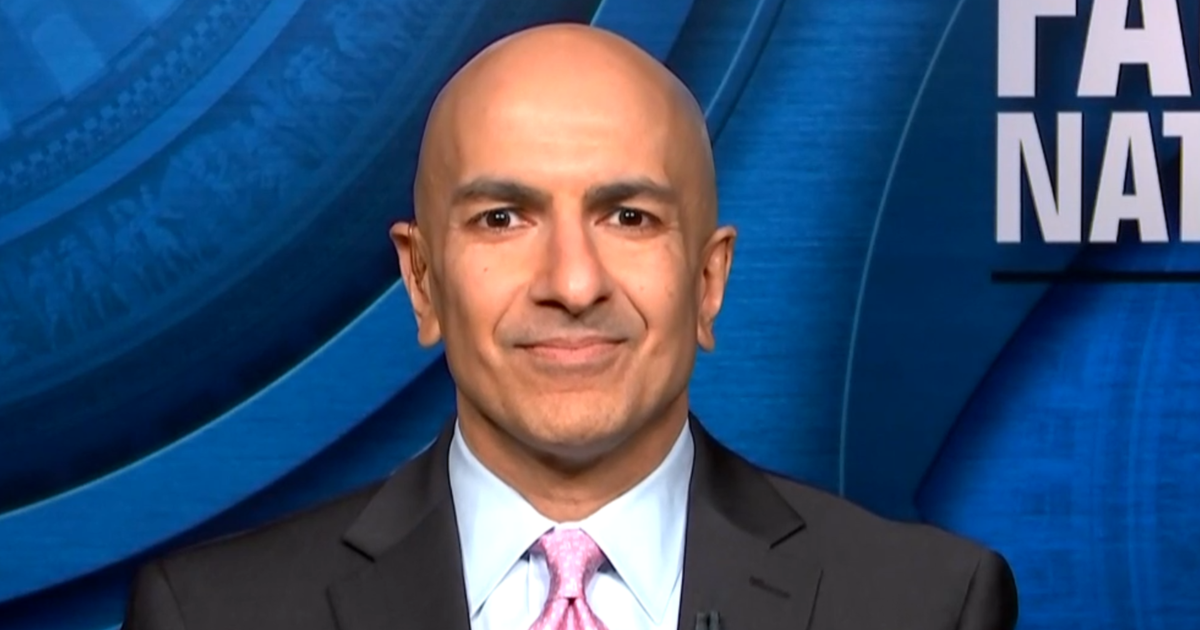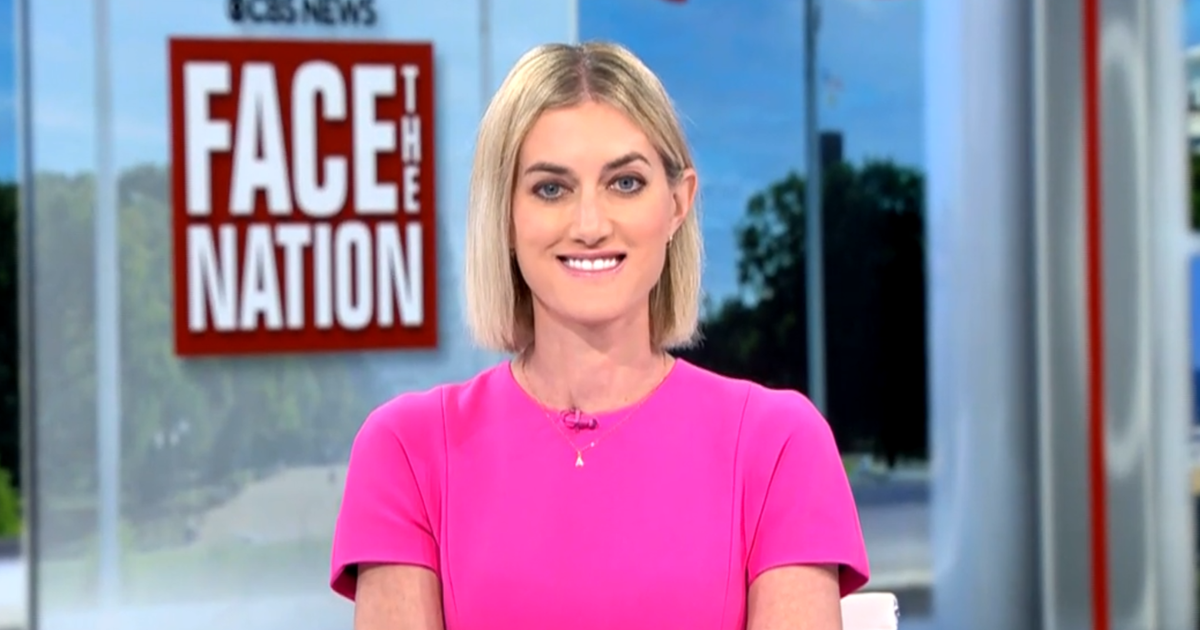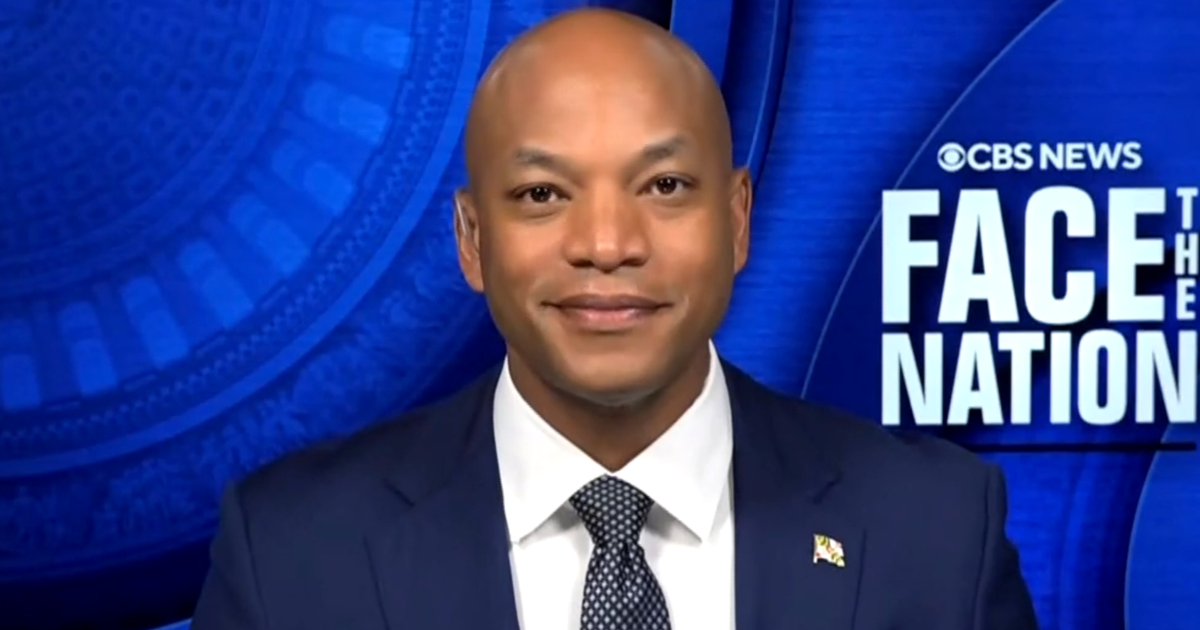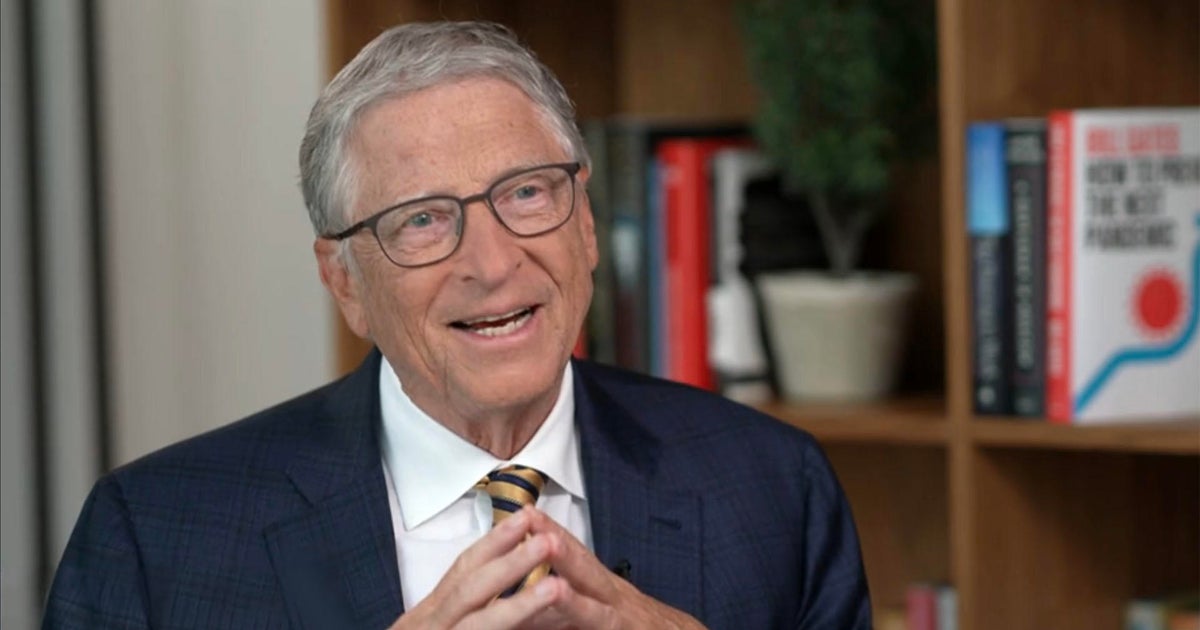Transcript: Transportation Secretary Pete Buttigieg on "Face the Nation," May 26, 2024
The following is a transcript of an interview with Transportation Secretary Pete Buttigieg on "Face the Nation" that aired on May 26, 2024.
MARGARET BRENNAN: And we're joined by the Secretary of Transportation, Pete Buttigieg. Good to have you here.
U.S. SECRETARY OF TRANSPORTATION PETE BUTTIGIEG: Good to be here.
MARGARET BRENNAN: You know, we look at polling and we see on both sides of the aisle griping about people feeling economic strain, but it doesn't seem to be keeping them off planes, it doesn't seem to be keeping them off the road this weekend. What are you expecting in terms of traveler volume and what the severe weather will do?
SECRETARY BUTTIGIEG: Yeah, we're seeing huge volumes, tens of millions of Americans traveling, either driving or flying. Last year, across several holidays, we had record-breaking air travel. We're expecting the same to happen this year. In terms of weather, certainly a number of thunderstorms affecting a number of hubs, but at this time, it looks like we'll- we'll largely see a pattern that resembles what we saw last year. Overall, last year, 1.3% cancellations- it was lowest in a decade. We're pressing the airlines to keep that up knowing that in order to keep that up, they've got to do it across even more volume this year. And that's part of why we're also making the long-term investments we are, in things like the capacity and the condition of our airports, through President Biden's infrastructure package.
MARGARET BRENNAN: But there is strain on the system when you have a large amount of volume and bad weather at the same time. I also wonder, when we see a forecast like we just did from NOAA that we're going to have a more severe hurricane season this summer, what you are thinking and planning for. Do you need to change regulation because of more severe turbulence as well?
SECRETARY BUTTIGIEG: The reality is, the effects of climate change are already upon us in terms of our transportation. We've seen that in the form of everything from heat waves that shouldn't statistically even be possible threatening to melt the cables of transit systems in the Pacific Northwest, to, as you mentioned, hurricane seasons becoming more and more extreme and indications that turbulence is up by about 15%. That means assessing anything and everything that we can do about it--
MARGARET BRENNAN: Here in the U.S.?
SECRETARY BUTTIGIEG: Well, in the atmosphere generally, but certainly something that will affect American travelers, whether here or abroad. Now, there are protocols and patterns for things like how pilots who encounter turbulence can notify those who might be coming in the path. But I do think we need to continually reevaluate that in the face of the reality that these things are more frequent and more severe than before.
We also, once again, need to be paying attention to the physical condition of our built infrastructure, whether it's airports, ports, roads- it makes no sense to build a road to the exact specification we required 100 years ago, have it be washed out, required to be put back just the way it was, and have it be washed out again. Which is why through the PROTECT program, the first dedicated resilience fund of its kind, another feature of the President's infrastructure package, we're making those kinds of improvements to various forms of transportation infrastructure across the country.
MARGARET BRENNAN: So you said tha- that horrific video that people were terrified by when they saw that Singapore Airlines encounter such severe turbulence that actually killed someone- that was rare. But you're saying you do expect to see more incidents like that here in the U.S.?
SECRETARY BUTTIGIEG: To be clear, something that extreme is very rare. But turbulence can happen and sometimes it can happen unexpectedly. That's one of the reasons why, you may notice compared to years ago, more often you'll hear the captain or the flight attendants ask you to keep your seatbelt on even if the light isn't saying that you're required to keep your seatbelt on. And again, this is something that has to continually evolve. Our climate is evolving. Our policies and our technology and our infrastructure have to evolve accordingly, too. This is all about making sure that we stay ahead of the curve, keeping aviation as safe as it is. It's not for nothing, that it became the safest form of travel in America. We've got to treat that not as some mission accomplished, but something you have to continually refresh to keep that safety record up.
MARGARET BRENNAN: Well, part of that is having enough people on the job, right? And you have this shortfall of 3,000 vacancies when it comes to air traffic controllers. I know the new reauthorization that just happened requires the hiring to happen. Why is it so hard to find people and how far into this are you?
SECRETARY BUTTIGIEG: So, we inherited about a decade of falling numbers in terms of the number of air traffic controllers in the workforce. We've stabilized that, largely because it's such a difficult job to train for. This is not something you can just come off the street and do, and even when you are qualified, when you've been through the academy and become a controller, you still might need to train a year or more on top of that just to work in a particular airspace. Think about the complexity of this job- and the U.S. airspace is actually the most complex in the world. The other part of the answer is resources. It's why I'm asking Congress for funds to hire 2,000 controllers next year. That's building on the 1,800 that's our target this year after hiring 1,500 last year. But believe it or not, hiring 1,500 air traffic controllers, when you factor in departures, retirements, attrition, that's just enough to about break even, which is why we're picking up the pace for hiring. That also means improving our capacity to hire air traffic- to train air traffic controllers. We have a fantastic academy in Okla- Oklahoma City. We're working with colleges and universities to be a force multiplier. Because what we can't do, of course, is in any way lower the standard. But we've got to make sure more people are brought in, trained, qualified, hired and retained at that high standard to do that work. Because, as you noted, what I would consider the ideal number of controllers on the workforce is about 3,000 more than we have today.
MARGARET BRENNAN: On Friday, Boeing released a report that said they saw a 500% increase in the number of employee submissions about safety concerns during the first two months of 2024. This is, of course, after all these high profile incidents that happened- with that plane door just flying off. Okay, it's good employees are seeing something and saying something but a 500% increase? I mean, that would suggest that there are actual issues here.
SECRETARY BUTTIGIEG: That's right, there's an encouraging part and a concerning part. The encouraging part is we want Boeing, and any producer in the aviation space, to have a culture of, if you see something, say something. We want to make sure those mechanisms for reporting work. We have both whistleblower mechanisms to let us know something directly at the FAA, but in a healthy company, that should also be happening within the company--
MARGRET BRENNAN: Were they discouraging it earlier?
SECRETARY BUTTIGIEG: If there were evidence of that- that would- that would lead to direct action. I'm not here to make an accusation like that at this time. But what I will say is, we want to see a culture where that kind of record- if anything, we want you to air on the side of reporting. So that's the encouraging part. The concerning part, of course, is that any of those issues are happening at all.
MARGARET BRENNAN: Right.
SECRETARY BUTTIGIEG: And that's why Boeing is under a huge amount of scrutiny right now, including from the FAA. The administrator took the extraordinary step of saying that Boeing cannot increase their production--
MARGARET BRENNAN: Right.
SECRETARY BUTTIGIEG: Until they've demonstrated that they can do it safely. And again, all of this is about making sure that we maintain the extraordinary safety record of U.S. aviation. That's not something that will happen by ever being satisfied with the status quo.
MARGARET BRENNAN: That FAA decision also goes with it that 90-day timeline and report that Boeing has to hand in next week, I believe--
SECRETARY BUTTIGIEG: That's right, those 90 days- the administrator gave Boeing 90 days to put forward a comprehensive plan. That ends more or less right at the end of May. So we're coming up on the period where Boeing will put forward their plan, FAA will assess it, then begins a process of accountability, monitoring, making sure they're conforming to that plan, and that it's getting the results that it should.
MARGARET BRENNAN: That doesn't sound like that moves quickly. When the FAA administrator was on another network this week and said Boeing has a "long road ahead" to improve safety. This is after saying there were systemic quality control issues, the need for real and profound improvements. These are not confidence inducing, you know, descriptions of the state of affairs there. How quickly is this gonna move?
SECRETARY BUTTIGIEG: Yeah, there needs to be some major change. And that's not overnight work. Now, to be clear, if there were an immediate safety issue, anytime there is, FAA acts immediately. It's why it took the extraordinary step of grounding, for example, all of those 737 MAX 9 aircraft until they could be specifically inspected and returned to service. So while any immediate or clear or present issue will be dealt with on immediate terms by the FAA under the administrator Mike Whitaker's leadership. There's also these broader processes, questions of culture that go from the C-suite and the board, all the way through to the shop floor in a healthy organization. And what we're really looking for is making sure that you see the benefits, the output of that throughout the organization, and then ultimately, in the product, which needs to be at the absolute highest standards of quality and reliability. Often, when we're in a conversation at the FAA, making a decision, they talk about a billion to one standard. In other words, for- for something to move forward, the chances of something going wrong would have to be less than one in a billion. A lot goes into maintaining that standard.
MARGARET BRENNAN: So that hold is not going to be lifted next week when this report is turned in? That's what it sounds like.
SECRETARY BUTTIGIEG: They're gonna have to do more to demonstrate their readiness to safely increase production. And again, obviously, the goal is for them to do so, but only on a safe and healthy basis.
MARGARET BRENNAN: I want to ask you about something that we hear quite a lot about on the campaign trail, and that is electric cars, electric vehicles. Donald Trump repeatedly talks about President Biden's decision to force the industry towards making 56% of car batteries* electric by 2032, 13% hybrid. Listen to what he said in New Jersey recently.
(START SOUND ON TAPE)
FORMER PRESIDENT DONALD TRUMP: Do you notice he's trying to save the electrical vehicle but not the gas powered, which is the vehicle that everybody wants. They're going crazy with the electric car, costing us a fortune. We're spending hundreds of billions of dollars subsidizing a car that nobody wants and nobody's ever gonna buy.
(END SOUND ON TAPE)
MARGARET BRENNAN: He's not wrong--
SECRETARY BUTTIGIEG: -- Oh he's wrong--
MARGARET BRENNAN: -- On the purchasing. He's not. Of the 4 million vehicles purchased, you know what- 269,000 electric vehicles were sold in the US market. It's up like 2%.
SECRETARY BUTTIGIEG: And every single year more Americans buy EVs--
MARGARET BRENNAN: -- But why aren't these moving more quickly--
SECRETARY BUTTIGIEG: -- This is really important. Every single year more Americans buy EVs than the year prior. There are two things that I think are needed for that to happen even more quickly. One is the price, which is why the Inflation Reduction Act acted to cut the price of an electric vehicle. The second is making sure we have the charging network we need across America. Even though most EV char- owners will do most of their charging at home, if you live in an apartment building or you're driving long distances, you need other options than those chargers. So that's exactly what we're working on. But I want to talk about the bigger point here. And I take this very personally because I grew up in the industrial Midwest, literally in the shadow of broken down factories from car companies that did not survive into the turn of the century because they didn't keep up with the times.
MARGARET BRENNAN: -- But many of those auto workers are concerned that electric vehicles require fewer humans to manufacture.
SECRETARY BUTTIGIEG: The most important thing is that the EV revolution will happen with or without us. And we've got to make sure that it's American-lead. And that's what the President is focused on. We don't want China- look under the Trump administration, they allowed China to build an advantage in the EV industry. But, under President Biden's leadership, we're making sure that the EV revolution will be a Made-in-America EV revolution, that is critically important--
MARGARET BRENNAN: Because of these tariffs you're talking about that President Biden says he's gonna roll out.
SECRETARY BUTTIGIEG: Well also just making sure we invest in America's capacity, making sure that we are onshoring or friend-sourcing the- friend-shoring the materials and the processing of what goes into these EVs, making sure that America masters these processes. Because look, there's no way that we're gonna get to the middle of this century, with the technology that we counted on a century ago. Now, there are obviously a lot of voices here in Washington who are interested in keeping the status-quo--
MARGARET BRENNAN: -- He says it's gonna be one of the first things he does--
SECRETARY BUTTIGIEG: He would be happy to see Americans trapped with dirty and expensive fuels. But the reality- and I know he's made a lot of promises to the oil and gas CEOs about some of the favors that he believes--
MARGARET BRENNAN: But--
SECRETARY BUTTIGIEG: His administration will deliver for them--
MARGARET BRENNAN: --obviously it's resonating for him, because he wouldn't bring it up so frequently if there wasn't some anxiety that he's tapping into. And let me ask about a portion of this that I think does fall under your portfolio and that's the charging stations you mentioned. The Federal Highway Administration says only seven or eight charging stations have been produced with the $7.5 billion investment that taxpayers made back in 2021. Why isn't that happening more quickly?
SECRETARY BUTTIGIEG: So the President's goal is to have half a million chargers up by the end of this decade. Now, in order to do a charger, it's more than just plunking a- a small device into the ground, there's utility work, and this is also, really, a new category of federal investment. But we've been working with each of the 50 states, every one of them is getting formula dollars to do this work--
MARGARET BRENNAN: Seven or eight, though?
SECRETARY BUTTIGIEG: --Engaging them and the first handful- again, by 2030, 500,000 chargers. And the very first handful of chargers are now already being physically built. But again, that's the absolute very, very beginning stages of the construction to come.
MARGARET BRENNAN: Right. But- but that gets to the point about not being able to make long distance travel possible quickly, if you don't have the infrastructure there to support it.
SECRETARY BUTTIGIEG: Right, so--
MARGARET BRENNAN: So you recognize it should be--
SECRETARY BUTTIGIEG: Most of the charging infrastructure right now is being provided by the private sector. The reason that we're investing federal dollars is to fill in some of the gaps in areas where it is not yet profitable for the private sector to do it. Now, again, the majority of charging will happen at home, and in some senses, an electric vehicle has more in common--fueling it--has more in common with charging your phone than it does with filling up a gas car, in ways that are both helpful and challenging. But that is exactly the transition that America is going through right now. And the other thing, again, is the price, right? We have seen the cost of EVs fall, to now where it's within a few percentages of an equivalent gas car. Depending on the model, you may come out ahead now, but it's depending on the model.
MARGARET BRENNAN: But that was part of these- these tariffs, though, as well, on Chinese-made electric vehicles--
SECRETARY BUTTIGIEG: Yeah, the tariffs are about making sure that--
MARGARET BRENNAN: --which would've been flooding with cheap electric vehicles.
SECRETARY BUTTIGIEG: Right, I mean, part of what we see, right, is China pouring huge resources into uncompetitive means, or I should say unfair means of competition. President Biden's not going to allow that to happen to the American auto industry.
MARGARET BRENNAN: But- but respond to this, because your fellow Democrat, Colorado Governor Jared Polis, called it "horrible news for American consumers," "a major setback for clean energy," that President Biden rolled out these tariffs, which he calls "direct, regressive tax on Americans, and this tax increase will hit every family." Why is he wrong?
SECRETARY BUTTIGIEG: Look, I- I have a lot of friends in the Democratic Party who believe in free trade no matter what. President Biden's perspective is a little bit different. Certainly believe in the value of international partnerships, but not going to allow something to happen that could threaten auto workers' jobs, or threatens America's chance to lead in the electric era of the automotive industry. Just as we led in the first go-round.
MARGARET BRENNAN: It's, like, less than 2% of- of cars. But on something else in regard to what many people might be wondering out there about road safety. It's- there are clear standards on drunk driving. What about high driving? Because there was this "New York Times" study recently that talked about car fatalities and it being linked to the rising prominence of legal marijuana usage. How do you test for that? How do you cut back on that?
SECRETARY BUTTIGIEG: Yeah, that's a real concern. It is not okay to drive under the influence of cannabis any more than it would be to drive un- under the influence of alcohol. And states have enforcement approaches that I think they're developing around the different state laws on- on what's okay. But whether or not it is okay in your state to purchase cannabis, it is not okay to drive while high. And we have a bigger set of challenges that this is part of when it comes to road safety in this country. We've got to learn as a country to take it as seriously as we do aviation safety, because we lose as many people to car crashes in this country as we do to gun violence, about 40,000 lives a year. Now one of my main objectives--
MARGARET BRENNAN: --And you think this is contributing to it?
SECRETARY BUTTIGIEG: Since getting this job- yes, certainly impaired driving as well as distracted driving. Both of those are an issue we're seeing particularly concerning trends in terms of pedestrians and cyclists. But, also we're seeing things we can do about it, like the new rule that we have put forward that will require automatic emergency braking. And part of what's compelling about that is the sensors on cars that will now no longer be just a bell and whistle on- that you pay extra for, but standard on every vehicle is it's not just that those sensors ought to be able to see as well as a human driver. They can see better, and they're going to intervene. So we're using technology where we can, we're investing in safer streets in hundreds of communities around the country that- and I remember this from being Mayor, working with mayors to want to have safer road designs but haven't had the funding, that's changing through President Biden's infrastructure plan. And we're also making sure that we drive a culture of safety that one day, we'll- we'll need to put these kinds of crashes in the past by- think of it this way. We already expect zero to be the appropriate number of American lives to lose in plane crashes. If that's our expectation for that form of transportation, it should be the same for- for roads. We cut the roadway death rate by about three to four percent last year that saved more than a thousand lives. We need to do the rest of it until we get to zero and I believe in our lifetime, we can do this as a country.
MARGARET BRENNAN: Secretary Buttigieg, thank you for your insights today.
SECRETARY BUTTIGIEG: Thank you.
MARGARET BRENNAN: We'll be back in a moment.
*An EPA rule finalized in March 2024 will give automakers a choice to produce 30% to 56% of new light duty vehicles as electric, with the balance consisting of a mix of other "clean vehicle technologies"



